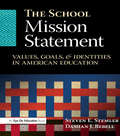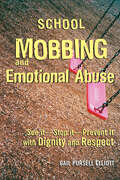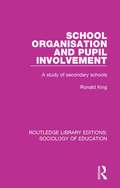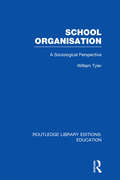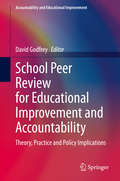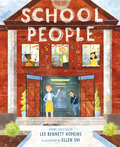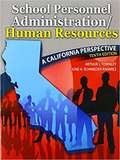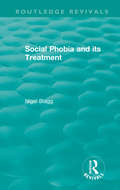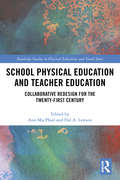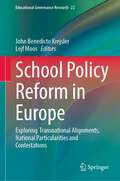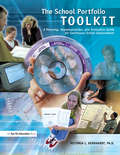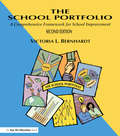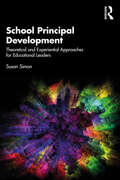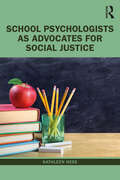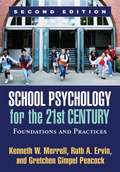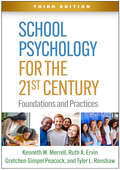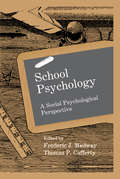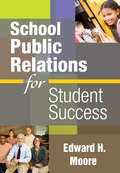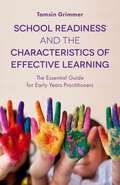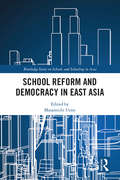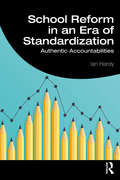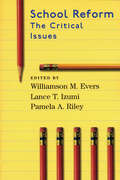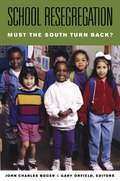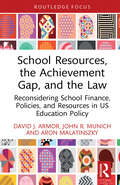- Table View
- List View
School Mission Statement, The: Values, Goals, and Identities in American Education
by Damian Bebell Steven StemlerThis is a must-have resource for busy educators involved in creating, improving, or reevaluating their school mission statements. The authors provide numerous examples of mission statements from a diverse range of preK-12 schools, offering readers an extremely valuable resource for developing an understanding of various themes and ideas in American education today - all to be better prepared to formulate their own schools' mission statements. Whether you are preparing for accreditation reviews, seeking a broader knowledge base, or are engaged in policy discussions, this practical, readable guide is packed with valuable information to help you reach your professional goals.
School Mobbing and Emotional Abuse: See it - Stop it - Prevent it with Dignity and Respect
by Gail Pursell ElliottFirst Published in 2003. Routledge is an imprint of Taylor & Francis, an informa company.
School Organisation and Pupil Involvement: A study of secondary schools (Routledge Library Editions: Sociology of Education #31)
by Ronald KingFirst published in 1973, this book is based on research carried about by Ronald King on integral parts of school organisation, including the assembly, uniform, rewards and punishments, games and out-of-school activities, curriculum, prefectorial system and school councils, in a sample of seventy-two schools. It measures and explores the level of pupils’ involvement in the school, in terms in their evaluations and effective dispositions, in relation to pupil age, sex and social background. This book will be a valuable resource for those studying the sociology and history of education, as well as educational research and school organisation.
School Organisation: A Sociological Perspective (Routledge Library Editions: Education)
by William TylerThe internal organisation of the school touches on many areas of contemporary debate. Is there such a thing as a ‘good school’? Are large urban comprehensives necessarily impersonal? Are the charges of indiscipline, conflict and declining standards in modern schools based on a failure to understand schools as institutions? At the time this book was first published sociological analysis had neglected to consider schools as organisational entities, preferring to see them as either the sites for negotiated encounters between teachers and pupils or else as agencies of class reproduction. The author redresses this imbalance and by relating the various literatures on the school to the constitutive patterns of its internal organisation he demonstrates the need for a more intensive sociological study of this embattled institution.
School Peer Review for Educational Improvement and Accountability: Theory, Practice and Policy Implications (Accountability and Educational Improvement)
by David GodfreyThis book explores how peer reviews are used in school improvement, accountability and education system reform. Importantly, these issues are studied through numerous international cases and new empirical evidence. This volume also identifies and describes barriers and facilitators to the development, use, sustainability and expansion of school peer review. School peer reviews are a form of internal evaluation driven by schools themselves rather than externally imposed, such as with school inspections. Schools collaborate with other schools in networks, collect data through self-evaluation and in school review visits. They provide feedback, challenge and support to each other. Despite the increased use of school peer review in system reform and school improvement, very little research has been conducted on this model and there is a dearth of literature that looks at the phenomenon internationally. This book fills this gap and will be an invaluable source for academics in school leadership and educational evaluation and accountability, as well as those working at the level of executive leadership in school networks, NGOs and in government policy-making.
School People
by Lee Bennett HopkinsFifteen poems selected by acclaimed poet and anthologist Lee Bennett Hopkins celebrate all of the grown-ups that children encounter during the course of a school day.Welcome to school, a building of brick "full of soul and heart," eager for students and staff to fill its halls with sounds. This anthology of fifteen poems celebrates the grown-up people that children encounter throughout the course of their school day: the school bus driver with her morning smile, the teacher who inspires imagination, the rarely seen, yet caring custodian, and the nurse who heals hurts, big and small. There's even a poem about the school building. Award-winning poet and anthologist Lee Bennett Hopkins has compiled this marvelous collection featuring a variety of brand-new works by well-known poets and beautifully imaginative artwork by illustrator Ellen Shi.
School Personnel Administration/Human Resources: A California Perspective
by Arthur Townley June H. Schmieder-Ramirez<p>Made popular by the Harvard Business School in the 1980s, Human Resources Management has become a fundamental part of any business, and different from other resources in the fact that people must be managed differently than other resources. <p>In an effort to accompany the growth and changing demographics of public education in the United States, School Personnel Administration/Human Resources: A California Perspective draws on the authors’ 70 years of teaching experience to help solve this growing problem. <p>School Personnel Administration/Human Resources: A California Perspective emphasizes the principles and practices of Personnel Management, with a focus on instructional staff and education as a whole.</p>
School Phobia and its Treatment (Routledge Revivals)
by Nigel BlaggThis book was first published in 1987. School phobia (or school refusal) is a puzzling problem that is still insufficiently understood. It is quite different from truancy and can lead to long-term adjustment difficulties if ignored or inappropriately treated. The purpose of this book is three-fold: first, to describe the nature of school phobia; secondly, to review the treatment literature exposing the common elements of the most successful, though theoretically different, approaches; thirdly, to provide a detailed step-by-step guide to the diagnosis and treatment of school phobia involving a rapid return to school and comprehensive behavioural management. The techniques and principles discussed are illustrated in a series of case studies. The book is aimed at parents and those professionals who regularly come into contact with children with school phobia, such as educational and clinical psychologists, child psychotherapists, behaviour therapists and family therapists, psychiatrists, paediatricians and family doctors, and teachers and researchers from all phases of education. If these professional groups could achieve a common understanding of school phobia, many more children could be treated quickly and effectively.
School Physical Education and Teacher Education: Collaborative Redesign for the 21st Century (Routledge Studies in Physical Education and Youth Sport)
by Ann MacPhail Hal LawsonSetting a common international agenda for physical education, this book asks how physical education and physical education teacher education can be reconfigured together so that they are responsive to changes in today’s fast-paced, diverse and uncertain global society. It argues that only a revolutionary move away from national policy silos can reinvigorate physical education and lead to improved, equitable outcomes for children and youth, and both novice and veteran teachers. Drawing on developing success stories in diverse places, this book emphasizes three important strategies: international-comparative analyses, which facilitate cross-border knowledge generation, innovation, professional learning and continuous improvement; solid, dynamic partnerships between teacher education programmes and exemplary school physical education programmes; and knowledge-generating teams consisting of exemplary teachers and teacher educators. Each chapter provides viable alternatives and rationales framed by unique national and local contexts. Significantly, these chapters announce that the work that lies ahead – and starts now – is a collective action project. It necessitates collaborative research and development among policy leaders, researchers, teacher education specialists, physical education teachers and, in some cases, school-age students. This is essential reading for all researchers with an interest in physical education or teacher education, and an invaluable source of new perspectives for physical education students, pre-service and in-service teachers, and educational administrators and policymakers.
School Policy Reform in Europe: Exploring Transnational Alignments, National Particularities and Contestations (Educational Governance Research #22)
by Lejf Moos John Benedicto KrejslerThis book discusses national school policy reforms in a number of key European countries and shows how these are framed in transnational collaborations that meet with national particularities and contestations. It gives an overview of school policy developments that represents the diversity of Europe within a comparative framework.It takes point of departure in the fact that European countries in their school and education policies have been increasingly aligning with each other, mostly via transnational collaborations, the OECD, EU, and the Bologna Process. Even the IEA has been instrumental to motivate alignments by means of influential surveys, knowledge production and methodological development. This alignment in terms of common standards, social technologies, qualification frameworks and so forth have aimed at facilitating mobility of students, workers, business and so forth as well as fostering a European identity among citizens from Europe’s patchwork of small and medium-size countries, representing a patchwork of different languages, cultures and societal contexts. In national recontextualizations, however, alignments have been continuously contested according to the particularities of what has been possible educationally and politically in the different national contexts. Furthermore, the return of national(isms) as well as the rise of edubusiness and digitalization have been increasingly influential. This book thus concludes that increasing transnational alignments have to be observed with meticulous attention to different national contexts that matter greatly.
School Portfolio Toolkit: A Planning, Implementation, and Evaluation Guide for Continuous School Improvement
by Victoria BernhardtThe School Portfolio Toolkit is a book that includes over 300 tools, strategies, templates, and examples for use in building school portfolios and for planning, implementing, and evaluating continuous school improvement. The Toolkit was written to support school personnel with the mechanics of putting together a school portfolio, as well as to offer processes and strategies to move whole school staffs into and through continuous improvement. The tools in the Toolkit will help staffs create, implement, and maintain school portfolios and begin the journey of continuous improvement. Each chapter deals with one topic related to the school portfolio and comprehensive school improvement, with related documents and tools. The School Portfolio Toolkit book provides templates, tools, examples, and strategies that will help you analyze your school's data, create a vision that is truly shared by the school staff, build a continuous school improvement plan to implement the school vision, formulate a leadership structure to implement the vision, involve parents, community, and business in implementing the vision, embed up to forty different powerful professional development designs into your school plan, evaluate your continuous school improvement work, and create a School Portfolio that will organize and serve as a framework for the continuation of this work
School Portfolio, The: A Comprehensive Framework for School Improvement
by Victoria. L BernhardtA school portfolio is the most effective way to ensure your school's success at systemic reform. Extensively tested, it is a non-threatening self-assessment tool which exhibits a school's goals, achievements, and vision for improvement. This book will show you how to develop a school portfolio tailored to your particular school and vision.
School Principal Development: Theoretical and Experiential Approaches for Educational Leaders
by Susan SimonWho would be a school principal these days? Alarming school issues appear daily in the media and there are reports of ever-increasing workloads impacting stress levels of principals, resulting in high attrition rates. As the role complexity increases and demands surge, would-be applicants must consider deeply their ambitions, their capacity and their knowledge about what it means to become a school principal. Fortunately, some teachers still consider becoming one, as, more than ever, our schools, our teachers and our students need great leaders. Theory, research-informed guidance and practical advice based on experience is gathered here for aspiring principals by a former school principal, now researcher in educational leadership. Topics of leadership skills development, self-care and wellbeing, the role of a mentor, effective career planning, and practical application advice are interrogated through reflective activities to probe motivations, aspirations and leadership career goals. The book can be used independently, as part of postgraduate study or during conversations with a mentor. Uniquely, this book also provides insights and pertinent advice from other current and former principals, and senior education executives predominantly in the Australian context. These rich personal narratives provide practical advice and, in their own individual ways, portray the realities, including the joys, of the job. What is experienced by principals in Australian schools, however, has significant alignment with what is facing school leaders in countries around the world. The maintenance of leadership pipelines must continue to be a focus worldwide to ensure that students are in schools led by great leaders.
School Psychologists as Advocates for Social Justice
by Kathleen NessSchool Psychologists as Advocates for Social Justice explores how school psychologists promote and protect the educational rights of children, using the author’s extensive experience as illustration. The roles of school psychologists have expanded from strictly assessment to advising school districts on how to improve school climate, helping schools face tragedy, and counseling students dealing with trauma. Combined with pertinent research, personal narratives describe challenges the author faced while a teacher and later as a school psychology practitioner and illustrate how necessary advocacy is in addressing the academic, behavioral, and emotional needs of students. Careful consideration is given to equity issues of disability, racism, Islamophobia, and bilingualism in schools. Combining informative personal experience with research, emphasizing the importance of children’s rights within the school community, and encouraging effective advocacy with legislative leaders, this book is a necessity for both new and seasoned school psychologists.
School Psychology for the 21st Century, Second Edition
by Kenneth W. Merrell Ruth A. ErvinA leading introductory text, this authoritative volume comprehensively describes the school psychologist's role in promoting positive academic, behavioral, and emotional outcomes for all students. The book emphasizes a problem-solving-based, data-driven approach to practice in today's diverse schools. It grounds the reader in the concepts and tools needed to become a competent, ethical practitioner; implement and evaluate multi-tiered interventions; and facilitate systems-level change. Useful pedagogical features include illustrative vignettes and end-of-chapter discussion questions and activities. New to This Edition *Incorporates up-to-date research findings and professional standards. Expanded coverage of response to intervention, cultural and linguistic diversity issues, and evidence-based practice in mental health. Chapter on legal issues includes expanded coverage of IDEIA and other recent federal mandates.
School Psychology for the 21st Century, Third Edition: Foundations and Practices
by Kenneth W. Merrell Ruth A. Ervin Gretchen Gimpel Peacock Tyler L. RenshawNow in a revised and updated third edition reflecting a decade of changes in the field, this leading text prepares new practitioners to support all students' academic, behavioral, and social–emotional success. The multiple roles and functions of the school psychologist are described and illustrated with vivid vignettes. Readers gain vital skills for planning and implementing evidence-based prevention and intervention efforts and collaborating to facilitate systems change. Guided by a problem-solving perspective, the book provides tools for effective, culturally responsive practice in today's diverse schools. End-of-chapter discussion questions and activities enhance learning. New to This Edition *Incorporates key advances in evidence-based assessment, intervention, and multi-tiered systems of support. *Increased attention to supporting the growing numbers of culturally and linguistically diverse students in schools. *Addresses changes in school psychology training programs and professional standards. *New emphasis on implementation science.
School Psychology: A Social Psychological Perspective (School Psychology Series)
by Frederic J. Medway Thomas P. CaffertyThis impressive volume reintroduces the importance of -- and the contributions made by -- social psychology to school psychology. It provides an overview of the basic areas of social psychology (history, attitudes, attribution, attraction, and research methods) as well as the traditional school psychology functions (assessment, therapy, and consultation). To unite these two crucial areas, the editors and their contributors provide detailed discussions of specific educational and social issues such as substance abuse prevention and treatment, loneliness, cooperative versus competitive environments, and integration of handicapped and culturally different children. Based on classical, contemporary, and cutting-edge research and theory, this text should become an essential reference tool for all school psychologists.
School Public Relations for Student Success
by Edward H. MooreFrom components of successful PR programs to evaluation guidelines, this valuable resource gives educational leaders the public relations support needed to meet tough communication demands and ensure student success.
School Readiness and the Characteristics of Effective Learning: The Essential Guide For Early Years Practitioners
by Tamsin GrimmerThis guide to understanding school readiness in young children is essential reading for early years practitioners. It explores the concept of school readiness by unpicking what the term means for children and how we can define it in the context of the characteristics of effective learning. This includes ideas for promoting playing and exploring, active learning and creating and thinking critically. The book also considers how we can ensure schools are ready to receive children and suggests ways in which preschools and nurseries can work collaboratively with schools and engage parents and carers to ensure a smooth transition.
School Reform and Democracy in East Asia (Routledge Series on Schools and Schooling in Asia)
by Masamichi UenoThis book discusses how East Asia has introduced school and curricular reform to reflect democratic citizenship and globalized skills, knowledge, dispositions, and competencies in the 21st century. It also focuses on the tendencies and reasons students from Japan, China, South Korea, Taiwan, and Singapore receive the highest scores in international students’ assessment such as PISA and TIMSS; yet their curiosity and motivation for learning are the lowest internationally. Moreover, Indonesian and Vietnamese students are likely to receive the lowest testing scores, yet their motivation for learning is quite high. It is worth investigating high academic achievement in East Asia in light of the trend towards democratization. The authors consider controversial issues such as whether the goals of democratic education should be the attainment of high academic scores, consideration of whether to implement competency-based curriculums or meritocratic systems of academic competition, and the provision of equal opportunities in the community of learning. The book illuminates each country’s struggle to realise school reform on the basis of its social and cultural settings, and looks at what connects East Asia’s past, present, and future.
School Reform in an Era of Standardization: Authentic Accountabilities
by Ian HardySchool Reform in an Era of Standardization explores how teachers and school-based administrators navigate the processes of accountability and standardization in schooling systems and settings. It provides clear insights into how the work and learning of teachers and students in schools have been dramatically reconstituted by increased pressures of external, political scrutiny and accountability. The book reveals in detail the nature and effects of standardization processes upon schools and schooling systems. Specifically, it shows how curriculum development, teaching and assessment practices have all been recalibrated under conditions of increased external scrutiny of teacher and student work and learning, and how such processes are manifest in curriculum dominated by attention to literacy and numeracy, more 'scripted' pedagogies and standardized testing. However, the research not only elaborates the detrimental effects of such processes, but also how those responsible for educating in schools – teachers, heads of curriculum, deputy-principals and principals – have responded proactively by interpreting, interrogating and challenging these conditions. In this way, it provides resources for hope – evidence of what are described as more ‘authentic accountabilities’ – and at the same time it provides a clear portrait of the difficulty of fostering substantive curriculum, teaching and assessment reform during an era of increasingly reductive accountability processes. It will be an invaluable resource for understanding and enhancing practices in schools and school systems in the decades to come, and for giving hope to educators in the ongoing work of rebuilding trust in public education.
School Reform: The Critical Issues
by Lance T. Izumi Williamson M. EversThis book explores a wide range of critical areas in education, examines the basic nature of our education problems, provides a clear understanding of underperformance, and proposes reasonable and effective strategies for success.
School Resegregation
by Gary Orfield John Charles BogerConfronting a reality that many policy makers would prefer to ignore, contributors to this volume offer the latest information on the trend toward the racial and socioeconomic resegregation of southern schools. In the region that has achieved more widespread public school integration than any other since 1970, resegregation, combined with resource inequities and the current "accountability movement," is now bringing public education in the South to a critical crossroads. In thirteen essays, leading thinkers in the field of race and public education present not only the latest data and statistics on the trend toward resegregation but also legal and policy analysis of why these trends are accelerating, how they are harmful, and what can be done to counter them. What's at stake is the quality of education available to both white and nonwhite students, they argue. This volume will help educators, policy makers, and concerned citizens begin a much-needed dialogue about how America can best educate its increasingly multiethnic student population in the twenty-first century.Contributors:Karen E. Banks, Wake County Public School System, Raleigh, N.C.John Charles Boger, University of North Carolina School of LawErwin Chemerinsky, Duke Law SchoolCharles T. Clotfelter, Duke UniversitySusan Leigh Flinspach, University of California, Santa CruzErica Frankenberg, Harvard Graduate School of EducationCatherine E. Freeman, U.S. Department of EducationJay P. Heubert, Teachers College, Columbia UniversityJennifer Jellison Holme, University of California, Los AngelesMichal Kurlaender, Harvard Graduate School of EducationHelen F. Ladd, Duke UniversityLuis M. Laosa, Kingston, N.J.Jacinta S. Ma, U.S. Equal Employment Opportunity CommissionRoslyn Arlin Mickelson, University of North Carolina at CharlotteGary Orfield, Harvard Graduate School of EducationGregory J. Palardy, University of Georgiajohn a. powell, Ohio State UniversitySean F. Reardon, Stanford UniversityRussell W. Rumberger, University of California, Santa BarbaraBenjamin Scafidi, Georgia State UniversityDavid L. Sjoquist, Georgia State UniversityJacob L. Vigdor, Duke UniversityAmy Stuart Wells, Teachers College, Columbia UniversityJohn T. Yun, University of California, Santa Barbara
School Resources, the Achievement Gap, and the Law: Reconsidering School Finance, Policies, and Resources in US Education Policy (Routledge Research in Education Policy and Politics)
by David J. Armor John R. Munich Aron MalatinszkyThis book offers a novel and up-to-date exploration of the common belief that increasing conventional school resources will increase academic achievement and help close gaps between various advantaged and disadvantaged students. Taking the scholarship around this question, such as James S. Coleman’s 1965 report on the Equality of Educational Opportunity, as a starting point, it brings in an extensive range of contemporary data sources and statistical analysis to offer an updated, robust, and considered review of the issue. Moving beyond these empirical questions, it also explores how these empirical findings have been utilized in “education adequacy” litigation, discussing the evolving law of adequacy cases, while explaining the challenges of introducing complex data and analyses within a litigation framework. Judges typically have little experience with the complexity of modern education data and the analyses required to draw sound inferences. It will thus be of interest to scholars, researchers, and faculty with expertise in education policy, the economics and sociology of education, and public policy.
School Resources, the Achievement Gap, and the Law: Reconsidering School Finance, Policies, and Resources in US Education Policy (Routledge Research in Education Policy and Politics)
by David J. Armor John R. Munich Aron MalatinszkyThis book offers a novel and up-to-date exploration of the common belief that increasing conventional school resources will increase academic achievement and help close gaps between various advantaged and disadvantaged students. Taking the scholarship around this question, such as James S. Coleman’s 1965 report on the Equality of Educational Opportunity, as a starting point, it brings in an extensive range of contemporary data sources and statistical analysis to offer an updated, robust, and considered review of the issue. Moving beyond these empirical questions, it also explores how these empirical findings have been utilized in “education adequacy” litigation, discussing the evolving law of adequacy cases, while explaining the challenges of introducing complex data and analyses within a litigation framework. Judges typically have little experience with the complexity of modern education data and the analyses required to draw sound inferences. It will thus be of interest to scholars, researchers, and faculty and jurists with expertise or interest in education policy, the economics and sociology of education, and public policy.
